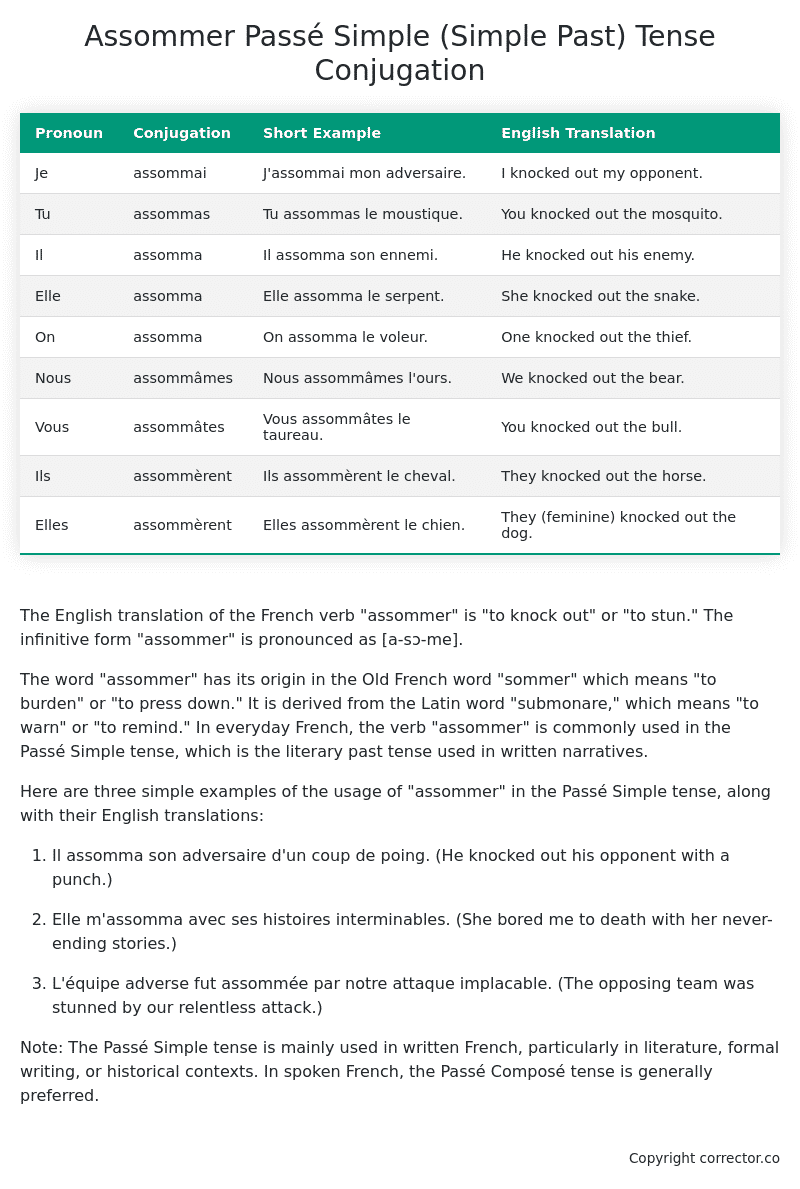Passé Simple (Simple Past) Tense Conjugation of the French Verb assommer
Introduction to the verb assommer
The English translation of the French verb “assommer” is “to knock out” or “to stun.” The infinitive form “assommer” is pronounced as [a-sɔ-me].
The word “assommer” has its origin in the Old French word “sommer” which means “to burden” or “to press down.” It is derived from the Latin word “submonare,” which means “to warn” or “to remind.” In everyday French, the verb “assommer” is commonly used in the Passé Simple tense, which is the literary past tense used in written narratives.
Here are three simple examples of the usage of “assommer” in the Passé Simple tense, along with their English translations:
-
Il assomma son adversaire d’un coup de poing.
(He knocked out his opponent with a punch.) -
Elle m’assomma avec ses histoires interminables.
(She bored me to death with her never-ending stories.) -
L’équipe adverse fut assommée par notre attaque implacable.
(The opposing team was stunned by our relentless attack.)
Note: The Passé Simple tense is mainly used in written French, particularly in literature, formal writing, or historical contexts. In spoken French, the Passé Composé tense is generally preferred.
Table of the Passé Simple (Simple Past) Tense Conjugation of assommer
| Pronoun | Conjugation | Short Example | English Translation |
|---|---|---|---|
| Je | assommai | J’assommai mon adversaire. | I knocked out my opponent. |
| Tu | assommas | Tu assommas le moustique. | You knocked out the mosquito. |
| Il | assomma | Il assomma son ennemi. | He knocked out his enemy. |
| Elle | assomma | Elle assomma le serpent. | She knocked out the snake. |
| On | assomma | On assomma le voleur. | One knocked out the thief. |
| Nous | assommâmes | Nous assommâmes l’ours. | We knocked out the bear. |
| Vous | assommâtes | Vous assommâtes le taureau. | You knocked out the bull. |
| Ils | assommèrent | Ils assommèrent le cheval. | They knocked out the horse. |
| Elles | assommèrent | Elles assommèrent le chien. | They (feminine) knocked out the dog. |
Other Conjugations for Assommer.
Le Present (Present Tense) Conjugation of the French Verb assommer
Imparfait (Imperfect) Tense Conjugation of the French Verb assommer
Passé Simple (Simple Past) Tense Conjugation of the French Verb assommer (You’re reading it right now!)
Passé Composé (Present Perfect) Tense Conjugation of the French Verb assommer
Futur Simple (Simple Future) Tense Conjugation of the French Verb assommer
Futur Proche (Near Future) Tense Conjugation of the French Verb assommer
Plus-que-parfait (Pluperfect) Tense Conjugation of the French Verb assommer
Passé Antérieur (Past Anterior) Tense Conjugation of the French Verb assommer
Futur Antérieur (Future Anterior) Tense Conjugation of the French Verb assommer
Subjonctif Présent (Subjunctive Present) Tense Conjugation of the French Verb assommer
Subjonctif Passé (Subjunctive Past) Tense Conjugation of the French Verb assommer
Subjonctif Imparfait (Subjunctive Imperfect) Tense Conjugation of the French Verb assommer
Subjonctif Plus-que-parfait (Subjunctive Pluperfect) Tense Conjugation of the French Verb assommer
Conditionnel Présent (Conditional Present) Tense Conjugation of the French Verb assommer
Conditionnel Passé (Conditional Past) Tense Conjugation of the French Verb assommer
Conditionnel Passé II (Conditional Past II) Tense Conjugation of the French Verb assommer
L’impératif Présent (Imperative Present) Tense Conjugation of the French Verb assommer
L’impératif Passé (Imperative Past) Tense Conjugation of the French Verb assommer
L’infinitif Présent (Infinitive Present) Tense Conjugation of the French Verb assommer
L’infinitif Passé (Infinitive Past) Tense Conjugation of the French Verb assommer
Le Participe Présent (Present Participle) Tense Conjugation of the French Verb assommer
Le Participe Passé (Past Participle) Tense Conjugation of the French Verb assommer
Struggling with French verbs or the language in general? Why not use our free French Grammar Checker – no registration required!
Get a FREE Download Study Sheet of this Conjugation 🔥
Simply right click the image below, click “save image” and get your free reference for the assommer Passé Simple tense conjugation!

Assommer – About the French Passé Simple (Simple Past) Tense
Formation
Usage
Narration
Historical Context
Interactions with other tenses
Passé Composé
Imparfait
Conditional and Subjunctive
Summary
I hope you enjoyed this article on the verb assommer. Still in a learning mood? Check out another TOTALLY random French verb conjugation!


